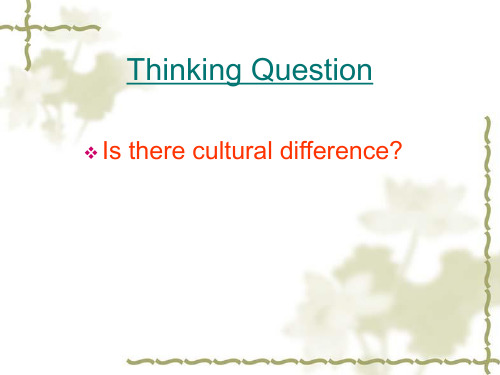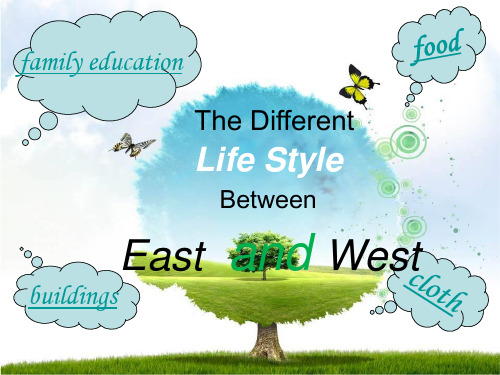Chapter 1-Why Cultures Differ
- 格式:ppt
- 大小:834.50 KB
- 文档页数:18




《跨文化商务交际》课程学习大纲课程名称:跨文化商务交际课程英文《跨文化商务交际》课程学习大纲课程名称: 跨文化商务交际课程英文名称:课程编码: 401022060 学时/学分: 32学时 3学分适用对象: 商务英语专业编写人: 张宁一、课程介绍《跨文化商务交际》为我国高等英语专业商务类核心课程之一。
同英语国家的人们用英语进行有效的交流是应用英语类专业教学的重要目的之一。
然而有效的交流不仅仅是一个语言技巧问题,还涉及到许多文化因素。
本课程的主旨是帮助学生解决在跨文化交际中因文化的差异而产生的种种问题。
二、课程学习目标通过本课程的学习,学生应能够认识语言、文化和交际三者之间的关系;对各类交际形式有所认识;对对象国文化有更进一步的了解,更有效地进行交流;预料和避免由于不同的文化期望而产生的误解;解释手势和其他形式的体态语;讨论有关文化适应和相容的问题。
学习目标一览表1. 掌握本课程的基础性内容,包括跨文化交际学的需求,发展简史及内涵等基本知识点的识记和理解。
知识2. 对跨文化交际理论有较系统的理解和掌握。
目标3. 能够结合本专业特点理论联系实际,透过现象把握其基本规律。
1. 通晓跨文化交流的本质、基本理论和技巧。
2. 了解文化差异产生的过程。
能力目标 3. 掌握基本的沟通方法和策略。
4. 提高英语语言运用能力和跨文化交际能力1. 培养科学、严谨的学习态度、执着探索、创新改革的科学精神。
文化素质2. 培养自身的国际视野、创新意识、跨文化交际和人际交往意识。
目标三、课程教学内容《跨文化商务交际》课程的教学内容共分为八个模块,每个模块由基础性内容、提高性内容、拓展性内容三部分构成,基础性内容是必须掌握的内容,提高性内容是在基础性内容的基础上对基本问题的探讨和梳理,拓展性内容是对所学知识的延伸性学习,是课程内容的前瞻性分析和理论延展。
第1至4章以跨文化交际学的基本理论为框架,阐述阐述交际、文化、跨文化交际等基本概念、交际与文化的关系;介绍文化差异在言语和非言语交际方面的表现;不同的文化价值观的理论划分,以及在文化层面上分析了人们在跨文化商务交际中存在的众多价值观念差异。

![新视野大学英语Unit_1[2]](https://img.taocdn.com/s1/m/381de160f5335a8102d2203c.png)
Unit 1Background:Cultural Differences:According to L. Robert Kohls, Director of Training and Development for the International Communication Agency and author of Survival Kit for Overseas Living, culture is, "an integrated system of learned behavior patterns that are characteristic of the members of any given society. Culture refers to the total way of life of particular groups of people. It includes everything that a group of people thinks, says, does, and makes--its systems of attitudes and feelings. Culture is learned and transmitted from generation to generation." (Kohls, 1984, p. 17).Every culture has distinct characteristics that make it different from every other culture. Some differences are quite evident (e.g., language, religion, political organization, etc.). Others can be so subtle that learning to deal with them is a complex process.(/~sap/handbook/chapter-9.html)Attitudes towards time in the American culture:Time is of utmost importance to most Americans. It is something to be on, kept, filled, saved, used, spent, wasted, lost, gained, planned, given, even killed. Americans are more concerned with getting things accomplished on time than they are with developing interpersonal relations. Their lives seem controlledby the little machines they wear on their wrists, cutting their discussions off abruptly to make their next appointment on time. This philosophy has enabled Americans to be extremely productive, andproductivity is highly valued in their country.(u.fi/~paganuzz/xcult/values/Amer_values.htm)A possible cause for Americans’ attitude towards time:The Just-In-Time system's stress on group work does not emerge from the national character or the Tokugawa heritage; it is industrial necessity, a means of achieving maximum efficiency. This idea is by no means alien to western economic theory. Just-In-Time pursues efficiency in the division of labor independent of cultural circumstances.(/content/sage/tas/1999/00000008/00000001/art00006)Warming-up questions:1.When watching a foreign movie (or in any other situation), did you find any difference between Chinese andforeigners in the way people behave?e.g.: in Growing Pain, Mike calls his father ―boy‖. Such a behavior is very disrespectful in Ch ina.2.Can you understand those differences? Will these differences affect you understanding the movie or thecommunication with foreigners?e.g.: the humor of western style may be difficult to understand for us3.Film Gua sha (增补内容)Gua Sha is a healing technique used in Asia by practitioners of Traditional Medicine, in both the clinical setting and in homes, but little known in the West. It involves palpation(触摸, 触诊) and cutaneous(皮肤上的,影响皮肤的) stimulation where the skin is pressured, in strokes, by a round-edged instrument; that results in the appearanceof small red petechiae(瘀点,瘀斑) called 'sha', that will fade in 2 to 3 days. Raising Sha removes blood stagnation(不流动,呆滞) considered pathogenic(病原的,致病的), promoting normal circulation and metabolic(新陈代谢的) processes. The patient experiences immediate relief from pain, stiffness, fever, chill, cough, nausea(恶心), and so on.The story begins here when the visiting grandpa who does not speak any English used this traditional practice to treat the grandson when both son and daughter-in-law were at work. The bright red marks on the skin causes a lawsuit(诉讼) of child abuse. In the court, the son Xu datong can not prove that Gua sha is a kind of safe and effective treatment and finally he loses custody(监护) of his son. Followed the loss of custody there was a chain of misfortunate. Xu datong, once a successful video game designer, got fired and segregated from his son and wife….The difference understanding about Gua sha between American authority and Xu’s family is the focus of the whole, which is the climax of the conflict raised by cultural difference. And in the story, there are many other interesting details reflecting the cultural difference. Xu’s son Dennis played together with his boss’s son and they quarrels. Datong comes to blame Dennis. Datong explains to the boss that he through this way shows his respect for the boss while the boss thinks he is ridiculous and that is the evidence of child abuse.4.A Game: Tom made an appointment at 8:00 with Jack. When do you think Tom will get to theplace of appointment? Below ―Tom‖ is of different nationalities. Please choose the appropriate time based on your impression of the cultures of countries below.If Tom is he may meet Jack atGerman /American, 8:00.Italian, 8:20.Indian, 8:30.Preview:1.―Communicating successfully with people of another culture is one of the most challenging things we do.‖(1)communicate vi. exchange information, news, ideas clearly with othersA politician must be able to communicate with people.communicating (successfully with people of another culture ): gerund as the subject in this sentencecommunication n. [U]: act of communicatingBeing deaf and dumb makes communication very difficult.(2)of another culture: This is a post attributive phrase modifying ―people‖.a woman of royal descent; the miners of Wales(3)challenge vt.: test the ability of (sb)The job doesn’t really challenge him.n. Opportunity and challenge exist together.challenging adj.: offering problems that test sb’s abilityThis is a challenging job for him.2.―…challenging things we do.‖―we do‖ is the post attributive clause modifying ―…things‖. ―that‖ is omitted in front of thi s clause.3.―Cultural differences cause most wars, political tensions and arguments between peoples and nations.‖(1)difference n. [U, C]There are many differences between this car and that one, but there’s little difference in color betweenthem.(2)cause vt. : make sth. happen/result inSmoking can cause lung cancer.(3)tension n. [U,C usu. pl]: condition when feelings are tense or relations between people, groups etc arestrained.The incident has further increased the tension between the two countries.tense adj. The relationship is tense between the two countries.(4)argument n. disagreement(5)people [pl]: personspeople [C]: (all the persons belonging to a ) nation, race, tribe or communityThe Spartans were a warlike people.4.―Unless we learn how others’ beliefs, values and customs differ from ours, we will likely destroy thisplanet.‖(1)―Unless‖ is used to direct the conditional adverbial clause. Here it means ―if…not‖.(2)Belief (pl. beliefs); knife (pl. knives); life (p. lives); leaf (pl. leaves)(3)values n. [pl]: moral or professional standards of behavior; principles(4)custom n.[C] usual and generally accepted way of behaving or doing thingsIt is difficult to get used to another country’s custom.Compare: customer, customs(进口税,关税;海关)(5)differ vi.: be differentdiffer from / be different from(6)the structure of non-clause directed by ―how‖: how + subject + predicate(7)likely adv.: probably It will likely rain.adj.: probable It’s likely to rain.5.―…to understand ours; all of us bear the responsibility of helping others to learn our ways.‖(1)ours pron.: In the text ―ours‖ refers to ―our culture‖.(2)The semicolon link the two sentences, making a how & why structure.(3)bear vt.: carry, assumetake/bear/carry/assume/shoulder the(full) responsibility(4)―to learn our ways‖ is the object complement of ―others‖.― the responsibility…our ways‖ as a whole is the object of ―bear‖.6.―The passages in this unit show how Americans regard time, how adjusting to another culture requiresfocused effort and how one person tried to relate in a different culture.‖(1)The objects of ―show‖ are three how-clauses which make the whole sentence read beautiful while listingthe main contents of the three texts in this unit.(2)regard vt. : consider, think about, regard (sb./sth.)as sth.I regard your suggestion as worth considering.We regard your action as a crime.(3)adjust vt.: adjust (sb./sth.) to sthYou would have to adjust to the campus life in university as soon as possible. In the second how-clause, ―adjusting to …‖ works as the subject of the clause(4)focused effort: concentrated effort(5)relate vi. :adapt (to)He couldn’t relate to the new environment.The generation gap makes it hard for children to relate to their parents.7.―…stop learning about our cultural differences.‖Compare: stop watching TV to learn Englishstop learning English8.―Our lives depend on it‖lives n.: the plural form of life.Section A: Time-Conscious AmericansMain idea: Americans value time highly, and use every possible equipment to spend time efficiently, because fulfilling a job successfully with speed is most appreciated in US.Focus: 1. Organize a paragraph with a general statement and specific supporting details.(Usually ask what, how, why to develop a paragraph.)2.Verbless clause with subject (独立主谓结构分句作状语)3.The use of prepositions after/before ―fall, account, slave, run, worthy, due, person probe etc.‖Text structure1.time-conscious adj. : This is a compound adjective. It means being conscious of time highly.In the whole text, we can collect a lot of compound adjectives: L.33 labor-saving, L.35 traffic-filled, after-work, L.39 face-to-face. And the following structures are very usual:N+adj.: grass-green, blood-red, snow-white, duty-free, color-blind, air-proofN+V-ing: peace-loving, time-costing, English-speaking,N+V-ed: handmade, heartbroken, heartfeltPart I. (Para.1-2) Americans value time highly.Questions:1 What does ―stand‖ mean in the first sentence?2 Try to find a Chinese idiom to translate the second sentence.3 Can you find some English or Chinese proverbs about time? (See Appendix I for reference)4 In Para.2, the writer tells us American people also charge for time. In what situation people would charge for time?Paragraph 12.―…no one stands still.‖Meaning: No one keeps motionless.(1)stand vi. : be in a certain condition or situation.Stand / Keep still while I do up your shoes.Because of her hard work, she stood first in her class.The house has stood empty for months.(2)still adj.: motionless, without movementStill water runs deep.So ―stand still‖ means to keep unprogressive.3.―If you are not moving ahead, you are falling behind.‖(1)ahead adv. : forwardmoving ahead: making progresses/ advancinggo ahead(with sth.): begin to do sth. without hesitationMay I start now? Yes, go ahead.(2)behind adv.: in/to a position at the back of sth.falling behind: ①being left further and further behindHe fell behind his workmates in work progress.②fail to do sth. at the proper timeIf you fall behind with the rent, you will be asked to leave.4.―This attitude results in a nation of people committed to researching, experimenting and exploring.(Translation: 这种态度造就了一个决心投身于研究,实验和探索的民族。
Culture DifferenceBy解忧知识As we all know,Chinese cultures are quite different from American cultures.Then how do we deal with the differences?Ignore,against or respect them?I believe most people would agree that we should respect the culture differences between nations.Otherwise,it will cause a lot of trouble when it comes.However,the first thing we should do is to get to know the culture differences,and then cope with it in an appropriate way or even learn something meaningful from the differences.There are some foreign teachers that are from America in our school. In order to get accustomed to the life in China,as well as get to know about their Chinese students.They are always trying to know more about Chinese culture.They are especially interested in the difference between the two nations,and we do often discuss this in their classes a lot. Certainly,we also need to understand and respect their culture,too.Only in this way can we communicate smoothly and get along well without offending each other.American boss is unlike Chinese boss in many ways.Apart from the lectures of foreign teachers,I have some experienceworking with one of my foreign teachers,Peter.He is typically American. Thus,I have great chances to know plenty of culture differences between China and America.I was definitely impressed at the first day I worked for him as an assistant.Unlike Chinese boss,Peter was willing to do the cleaning of his company with us employees.What’s more,he greets us friendly and asks how we are doing recently every single time we enter the company.It seems like he cares about what’s going on in his employee’s daily life besides the things that are related to the work.Furthermore,he very often encourages us to have a try when we meet difficulties in work.He inspired us in a not harsh but gentle way by saying,“Would you like to have a try?”or“Well,probably you can give it a try and see what will happen,all right?”But if we still get no luck after trying.He doesn’t blame us for anything,or be disappointed in us either.On the contrary,he would understand the difficulty of the assignment and smiles at us and says,“Thank you for trying.I appreciate it.”In addition,what make me feel delightful is that he appreciates and praises our accomplishments no matter how little it is.He often says to us like“good job today.”“I’m impressed.You are capable of many things.”.I was amazed when I received a thank-you note from him while receivingmy salary.I could hardly imagine Chinese boss would do that for me in my future jobs.Actually,it’s common that Chinese bosses are often too ready to blow cold wind of harsh criticism on their employees instead of giving encouragement to them.They are somehow reluctant to give a warm-sunshine of praise to their employees.American’s concept of time.I’ve long heard that Americans care much about time.In their eyes, time is money.Time is knowledge.They are more likely to spend almost all day at work.They always rush all the time.Take Peter as a typical example,he keeps himself extremely busy with work in weekdays and even on weekends.He really has very little free time since he is either teaching at school or on his way to the company.It seems to me that he never tries to slow down his pace.We might think life like that is obvious overwhelming.But he remains energetic and spirited everyday to face the overloaded work.He told us time is everything in American.In American streets,you can hardly see a man walking slowly.They walk pretty fast. In fact,they are almost running.He learns to value time from childhood. As children,they are taught to be on time to go to school,to work,and do everything.That somehow reminds me of our meetings.We are constantly being late for meeting or any gathering.Anyhow,to respect their culture,I’m seldom late at work.Despite the long distance from ourschool which is kind of killing me,I manage to get to Peter’s company on time.At Peter’s part,he is punctual,too.He thinks it’s very rude of boss to be late at work.Different behaviors and study habits between Americans and Chinese.First of all,we can see that Americans use their body language much than we do.They are gesturing in a vivid way through their body language when they talk.Like many Americans,Peter’s nonverbal communication is quite various and students are amused by his active and even exaggerated gestures.Therefore,his class is full of laughter.Knowing the habit they own,I manage to look at Peter into the eyes when I went for the interview of this job.They believe that maintain eye contact with the interviewer show that you are confident and sincere and don’t attempt to deceive them.I know eye contact may not get me the job, but lack of eye contact can reduce the chance dramatically.Although looking straight at others made me uncomfortable,I was glad it somehow worked eventually.Secondly,American teachers are confused why we don’t like raising our hands and asking questions in class while students in American arekeen on asking their teacher countless questions.American teachers make great efforts to encourage and persuade students to raise questions.But, still,the habits are rooted in our mind and we’re just too used to keeping silence and busy taking notes in class.As a result,the teachers feel quite upset of it and think we somehow don’t respect their teaching.But the truth is that we don’t intend to disrespect them.They might understand this if they known the habit of Chinese and the cause of it.Lacking of tolerance can really cause many unpleasant moments.This reminds me of one of my foreign teachers.She seldom shows any appreciation or even respectability of Chinese cultures.She often complains the bad side of China and expresses how she doesn’t like the way Chinese do things.I remember at her first class,several students were late for class and then showed up later at the front door apologizing for being late.Much to our surprise,she was very angry and blamed them for being rude to interrupt the lesson by their apologies.I don’t think what she did was reasonable.In fact,we apologize for being late instead of coming into classroom saying nothing to show our respectability to the teacher.She has come to china for several years,and she should have known some basic Chinese cultures,but sadly she hasn’t.I think we all should understand culture differences and respect each other.If she find herself really can’t get accustomed to it,she at least should gently tell usnot to interrupt the class like that and just slip into the classroom without making any sound.I’m certainly convinced that we would like to accept the differences and do accordingly.Every culture has its own principles,ideas,and habits.We can’t simply judge it by saying what it’s right or wrong.What we should do is to be more open-minded and respect or accept the culture differences.In a word,I think mutual understanding between different cultures plays a key role in studying or working friendly with foreigners or living happily in a foreign country.Respecting each others’cultures will certainly help to build a friendly relationship between Americans and Chinese.。
Chapter 1 CultureI. Teaching ObjectivesIn this chapter, the teacher should enable the students to:1. understand concepts concerning culture.2. recognize the nature of culture.3. describe the definitions and characteristics of culture.4. discuss about cultural identity and cultural varieties.II. Contents1. Keywords(1) Culture (from intellectual perspective): Culture is “the arts and other manifestations ofhuman intellectual achievement regarded collectively”(从知性角度定义文化:作为整体的人类智力成就的艺术和其他表现。
)(2) Culture (from anthropologic perspective): Culture consists of patterns, explicit and implicit,of and for behavior acquired and transmitted by symbols, constituting the distinctive achievement of human groups, including their embodiments in artifacts; the essential core of culture consists of traditional ideas and especially their attached values”.(从人类学角度定义文化:文化由清晰和模糊的行为模式构成,这些模式通过符号获得并传播,这些符号由人类群体的特别成就构成,包括具体的人工制品。